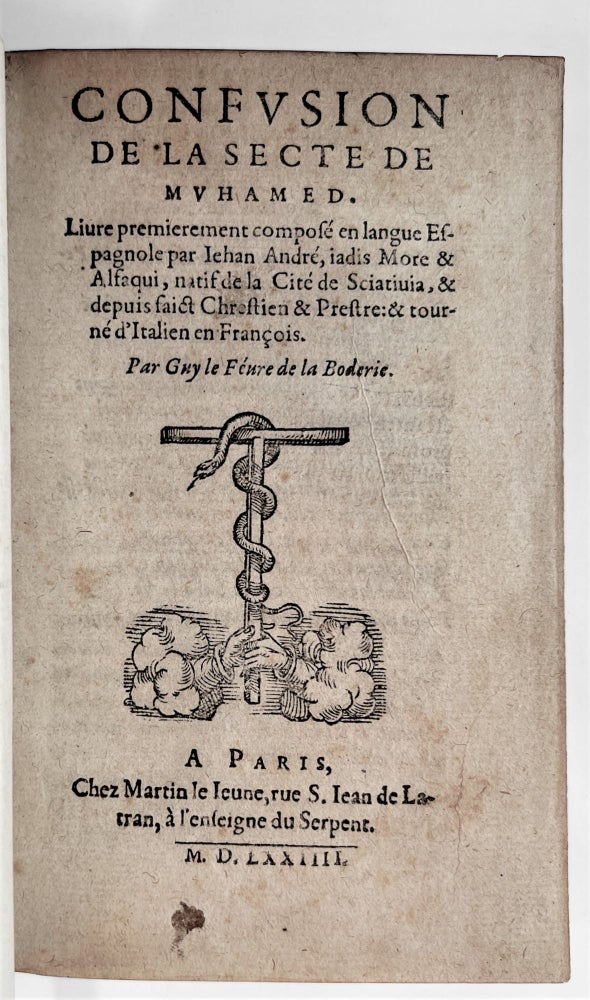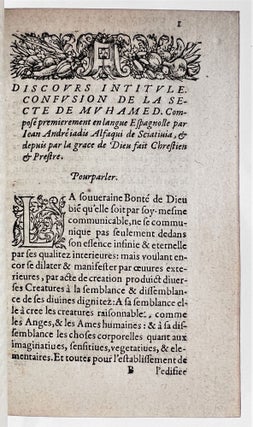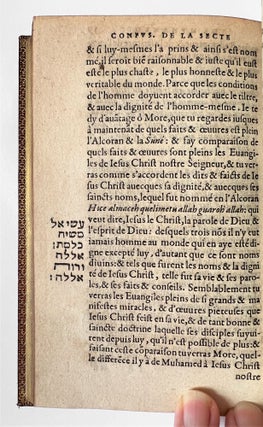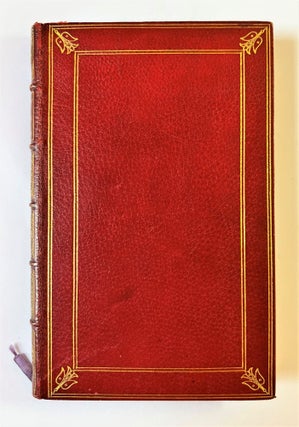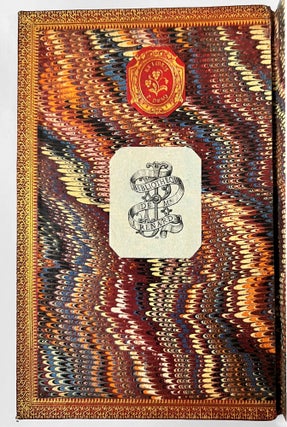Confusion de la secte de Muhamed. Paris: Martin le Jeune, 1574.
Small 8vo (151 x 92 mm). [6 ], “99” [recte 100] leaves (several foliation errors). Woodcut printer’s device on title (Renouard 609), headpieces and initials. Shoulder notes including some Hebrew text. Occasional light foxing, but a fine copy. 19th-century red morocco gilt, gilt edges, by L. Tripon. Provenance: Paul Desq (1816-1877), red gilt bookplate, his sale, Paris, 25 April 1866, lot 119 (misdated 1584); Joseph Renard (1822-1882), Lyonese bibliophile, bookplate, (his?) neat ink notes in front flyleaf. ***
First edition in French of an ultimately ambivalent polemical work against Islam. First published in Valencia in 1515, the work was quickly forbidden by the Inquisition because of its inclusion of many transliterated Arabic passages from the Qur’an and the Sunna, resulting in the almost total suppression of that Spanish edition (3 copies located: BL, LC, and Brescia). Because of its rarity, the French orientalist Guy Lefèvre de La Boderie (1541-1598) was forced to rely on an Italian translation by Domingo de Gaztelu as the basis for his translation, which maintains the transliterations from the arabic. The learned notes, printed in the margins, are the translator’s contribution.
Andrès, a native of Xativa or Jativa in Valencia, was, like his father, a Muslim legal scholar, an alfaqui. In an uncanny parallel to Paul of Burgos, a rabbi who became Bishop of Burgos and wrote a scathing polemic against Judaism, Andrés (the name he took at baptism) converted to Catholicism in 1487, became a priest, and, having been asked by his King and Queen to help convert the Muslim population after the fall of Granada in 1492, wrote this critique of the Muslim religion. Just like his ex-Jewish predecessor, this former Muslim used his intimate familiarity with the texts of his rejected faith to argue against them.
“Citing the Qur’an and hadith literature in Arabic transliterated into the Roman alphabet, Juan Andres produces something original in his work. Few sixteenth-century texts in the genre (whether in Latin or Romance) show such a command of primary material and at the same time participate so plainly in the Latin and pan-European polemic.... Though written in Castilian, the Confusión contains long citations from the Qur’an and Islamic traditions, transliterated into Roman script. It is not only a source of knowledge about Islam in medieval and early modern Iberia, but also about regional Arabic itself.... The Confusión includes an introduction and twelve chapters. The first ten chapters focus on Islamic history, doctrine, and tradition with the intent of providing as much explanation about Islam as possible while also attacking it according to the traditional polemic. The eleventh chapter is an apology for Roman Catholic orthodoxy, one that asserts the basic Christian truths via Islamic texts; the last chapter explains why Islam's rapid expansion should not be understood as divine affirmation of its validity, a perennial issue for Christians. The author addresses a priestly readership and clearly intends his text for such an audience, as we can see from his careful description of Islamic doctrine and history.... The work is `missionary’ in the sense that it is a manual for Christian leaders and priests; it is not a text meant to be directly read by Muslims or by Moriscos” (Busic, pp. 88-91).
Busic argues, however, that the author retained a certain ambivalence, and hovered, like Spain itself, between two worlds, Muslim and Christian: “In Juan's text we find that neither he nor Spain is purely Christian or purely Muslim. They are not quite either.... At times ... the Qur’an and the Sunna are appreciated for what they represented to Muslims in Spain. Religions and cultures are intentionally separated, but sometimes they touch and transform each other, whether through belief, popular practice, or language” (op. cit., pp. 107-110),
Of this edition I locate only one certain copy in an American library, at the Morgan Library. (USTC records a copy at the UC storage facility the Southern Regional Library Facility, but the UCLA catalogue is unenlightening, as it is not clear whether it actually holds a physical copy.)
Palau 12176; Brunet I: 265; USTC 8560; BM STC French, p. 17; cf. J. Busic, “Polemic and Hybridity in Early Modern Spain: Juan Andrés's `Confusión o confutación de la secta Mahomética y del Alcorán,’” Journal for Early Modern Cultural Studies, Vol. 12, No. 1 (Winter 2012), pp. 85-113. Item #4288
Price: $5,000.00

